Putin fears another coup as Russia finally begins to buckle
Panic in the Kremlin as it runs out of cards to play just as Trump turns the screws
By Melissa Lawford, US Economics Correspondent
When Russia’s special forces hauled Mikhail Khodorkovsky at gunpoint off a private jet before dawn in Siberia in October 2003, it marked a pivotal moment in the early years of Vladimir Putin’s regime.
Khodorkovsky, who controlled the oil and gas company Yukos, was then the richest man in Russia and had been openly critical of the president. He became the first oligarch to be jailed as Putin cracked down on any sign of dissent.
The subsequent destruction of Yukos was the beginning of the end of any kind of market economy or transparency in Russia.
Almost exactly 22 years later, Russia is a totalitarian state. And Putin apparently again considers Khodorkovsky to be a threat.
This month, Russia’s Federal Security Service (FSB) accused Khodorkovsky, who now lives in exile in London, and 22 members of Russia’s Anti-War Committee of plotting a coup.
According to the FSB, the committee, which was created to oppose Russia’s war in Ukraine, is vying for “the violent seizure of power and overthrow of the constitutional order in the Russian Federation”.
Khodorkovsky says the allegations are lies. Kremlinologists say it is a clear sign of a new sense of vulnerability at the heart of the Russian state.
“It tells us that the Kremlin is being paranoid,” says John Herbst, the senior director of the Atlantic Council’s Eurasia Center and former US ambassador to Ukraine. “Putin is looking for enemies to try to bolster his regime.”
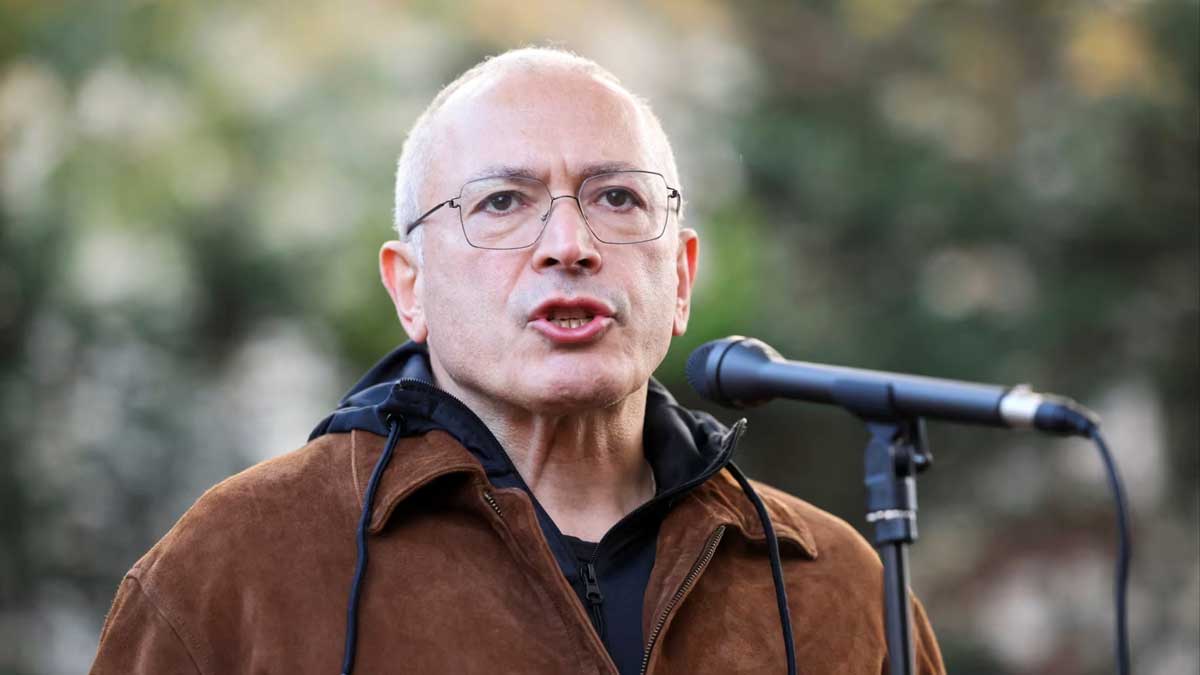
Suddenly, Putin has many reasons to be worried.
Russia’s economy is beginning to buckle. Businesses have been crippled by high interest rates, government borrowing costs have soared and economy minister Maxim Reshetnikov warned in June that the country was “on the brink of a recession”. Warnings are mounting over a potential avalanche of bad debt that could trigger a financial crisis.
Small pockets of protest are emerging. Earlier this month, hundreds of people gathered in St Petersburg Square to sing an outlawed song calling for Putin to be overthrown.
Meanwhile, Ukraine has been aggressively ramping up its drone attacks on Russian oil refineries, hammering the country’s petrol supplies.
Now Donald Trump is turning the screws. After frustration over a lack of progress to end the war in Ukraine, the US president announced new sanctions on two of Russia’s biggest oil companies on Wednesday.
India and China, the main buyers of Russian oil since the war began, responded by curbing purchases. It threatens to cut off crucial oil revenues to Putin’s war machine – and the Russian state.
“For the first time in three and a half years, Russia’s really getting hurt,” says Timothy Ash, an associate fellow at Chatham House’s Russia and Eurasia programme. “I think there’s some panic.”
Banking crisis looms
Russia’s economy has so far been remarkably resilient during the war with Ukraine, defying predictions it would collapse after an initial wave of worldwide sanctions were levied.
One of the reasons why it has weathered the storm so far is because the Kremlin has pushed banks to lend to defence companies, rather than simply using state cash.
To do so, it gave them the green light to lend without the usual credit checks or reserves to cover potential defaults.
“They were funding the war with borrowed money all along, it just wasn’t showing on the state’s balance sheet,” says Craig Kennedy, of Harvard’s Davis Center for Russian and Eurasian studies.
Kennedy has first-hand experience of how the Russians operate. He is the former vice chairman at Bank of America Merrill Lynch and led the financing of Russia’s largest ever corporate transaction during his time in banking.
He warns: “This is just a dark pool of debt and nobody quite knows how much is going to default once it matures.”
The sums involved are huge. Around 23pc – no less than $190bn (£143bn) – of Russian banks’ outstanding corporate loans are now to arms companies, according to Kennedy’s analysis. This is equivalent to around 37pc of the annual state budget.
Not only was this money lent without proper credit checks, but it has gone to a sector that has a bad credit history. All sectors in Russia are also grappling with the pain of high interest rates. The central bank rate hit a two-decade high of 21pc last October and now sits at 16.5pc.
Sergey Chemezov, the chief executive of Rostec, Russia’s largest arms producer, warned last October that the high borrowing costs were unsustainable for the sector. “If we continue to operate like this, practically the majority of our companies will go bankrupt,” Chemezov said.
German Gref, the chief executive of Sberbank, Russia’s largest bank, warned in June: “We see now that a lot of enterprises are starting to have trouble servicing loans and the cost of risk and provisioning is also going up for banks.”
In July, Bloomberg reported that at least three of Russia’s largest banks were quietly preparing to request a central bank bailout as their bad loans piled up.
Senior managers have signalled privately that loan portfolios are in far worse condition than official statistics suggest.
Elvira Nabiullina, the central bank governor, has insisted that warnings of a systemic crisis are “absolutely unfounded” and Russia’s banking system is well-capitalised.
Yet it is not just defence. Vladimir Milov, an exiled opposition politician who was formerly a deputy energy minister under Putin, says: “What you see this year is skyrocketing numbers of credit restructuring for corporate borrowers. Restructuring means that actually borrowers cannot perform.
“If you recall the experience of the past crises in Russia, it all happens very suddenly with the banks. It all seems okay until they suddenly find there’s an avalanche of non-performing borrowers.”
In May, a report by the state-affiliated Center for Macroeconomic Analysis and Short-Term Forecasting warned of a rising risk of a systemic banking crisis.
“Could it spill into a systemic crisis? These are absolutely the right preconditions for that,” says Kennedy. “It won’t necessarily. But sooner or later, they’re going to have to deal with this big overhang of bad defence debt.”
Whatever happens, the money has now dried up. Last autumn, Nabiullina took steps to limit bank lending in an effort to rein in inflation, which peaked at 10.3pc in March.
“You had a huge credit surge through November of last year and then lending dropped off a cliff in December and it’s been low ever since,” says Kennedy.
Loans to arms manufacturers are now at 65pc of the levels seen last year, according to an upcoming report by Kennedy for his Substack, Navigating Russia.
“In terms of being able to buy victory on the battlefield, Moscow already understands it’s beyond their capability,” says Kennedy. “The longer they wait, the greater the risk of a crisis, because the debt situation isn’t going to fix itself.”
‘No one has any cash’
The war is hitting home for ordinary citizens. Thick plumes of smoke have been rising from Russian oil refineries across the country this year following an unprecedented barrage of Ukrainian drone attacks.
Since January, Ukraine has hit 21 of Russia’s 38 largest refineries where crude oil is refined into products like petrol. It has struck as far as 683 miles into Russia from the Ukrainian border.
So much supply has been knocked out that petrol prices have surged by 40pc since the start of the year. Officials have introduced rationing in occupied Crimea while small petrol stations in Siberia have closed down. Social media is filled with video footage of enormous queues of cars waiting to fill up.
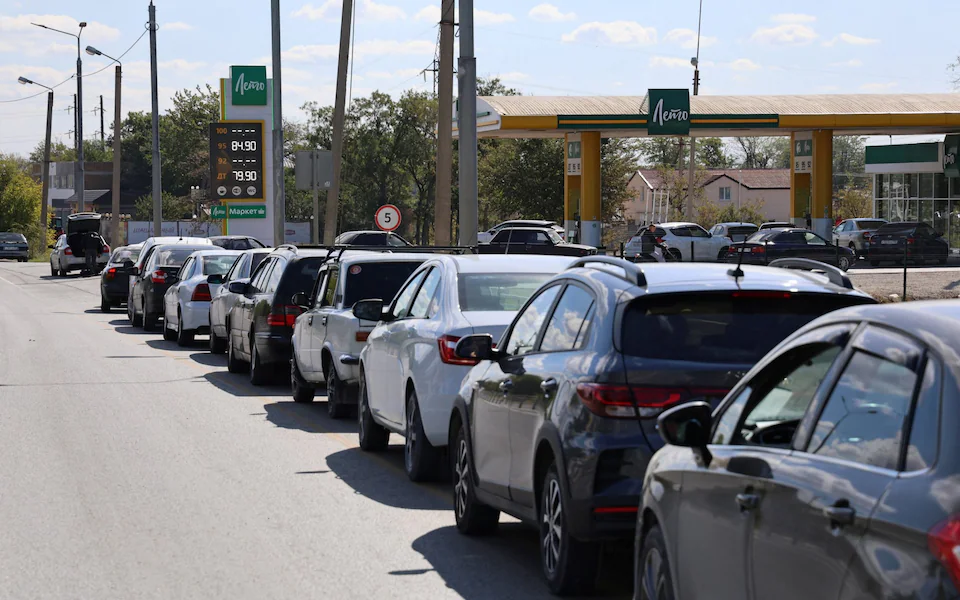
The strikes come against a backdrop of stagnation. In 2024, real Russian GDP rose by 4.3pc. This year, the International Monetary Fund expects growth of just 0.6pc.
Military production has become the economy’s only source of growth. Sergey Aleksashenko, head of economics at the New Eurasian Strategies Center and formerly Russia’s deputy finance minister, says that the civilian sector “is to a great extent in recession”.
“No one has any cash,” a board member of a major Russian conglomerate told Eastern European news publication IntelliNews earlier this year. “Every spare ruble is being eaten up by debt repayments.”
Kremlin anxiety
Putin has experienced attempted coups before. In June 2023, Yevgeny Prigozhin, the Wagner Group leader, led an uprising against the government after months of feuding with top military officials. Prigozhin did not succeed, and died months later in a plane crash.
But Khodorkovsky is not leading a march to Moscow. After spending a decade in Siberian jail, he was freed in 2013 and moved to Europe, where he founded the Anti-War Committee in 2022. The FSB’s criminal case came after the Parliamentary Assembly of the Council of Europe, a human rights group, launched a platform for dialogue with Russia’s democratic opposition in exile.
Khodorkovsky tells The Telegraph the FSB’s accusations against him show the Kremlin has “anxiety over the issue of power transition”.
If Putin dies tomorrow, he will have no obvious successor.
“What do we have in Russia?” Khodorkovsky says. “A prime minister whom no one elected but whom Putin appointed. Courts appointed by Putin. A parliament whose seats were filled through falsified elections, and whose legitimacy no one believes in.
“The international legitimacy of the Russian opposition could become a significant factor in the event of a sudden power transition.”
Putin is therefore keen to discredit and intimidate the Anti-War Committee, argues Khodorkovsky.
He is not the only one who takes this view. Angela Stent, director emerita at Georgetown University’s Center for Eurasian, Russian and East European Studies, says: “They want to reinforce Putin’s line that the West is trying to break up Russia.”
The Kremlin is known for using this playbook when Russia is restless.
“When they feel the heat, they simply increase the numbers of those who are being announced as undesired foreign agents or extremists,” says Milov.
“It’s their classic bureaucratic response when they generally feel insecure about potential popular discontent.”
Khodorkovsky says Russia’s economic problems are not yet driving serious dissent at home. “The population notices the problems, but they are not yet severe.”
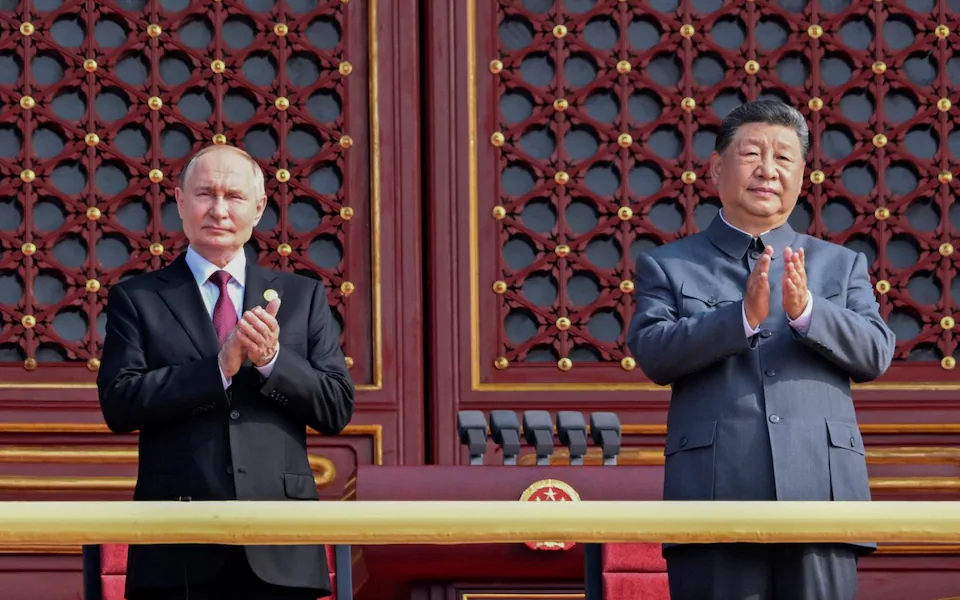
But Western sanctions have created significant problems for the country.
“The first is growing technological backwardness,” says Khodorkovsky. “Russia is becoming increasingly archaic, unable not only to produce innovations but even to adopt those of others. This is not very visible in the short term, but in 10 to 20 years it will lead to major problems.”
The second issue is Russia’s new critical dependence on China. Khodorkovsky says: “Putin’s war machine relies heavily on cooperation with the PRC. Xi Jinping could collapse the Russian economy and stop the war tomorrow if he chose to.”
China is a lifeline for Russia because it buys its oil. But Beijing is not supporting Moscow wholeheartedly.
At the start of 2024, China reinstated tariffs on Russian coal imports. At the same time, it has been flooding Russia with cheap steel imports and cars.
Domestic companies are struggling to compete. Avtovaz, the company behind Russia’s best-selling car, said in July it was considering shifting to a four-day working week because of plunging sales and foreign “price-dumping”.
Maxim Oreshkin, an economic adviser to Putin, said in June: “The model that ensured growth in recent years has largely reached its limit.”
Deficit disaster
There is another issue waiting in the wings. Russia’s public finances are spiralling into a mess.
Russia’s deficit is ballooning. Since the start of the year, the Russian ministry of finance has raised its deficit target for 2025 to 2.6pc of GDP, more than five times the 0.5pc it had expected at the start of the year and by far the largest annual deficit since the pandemic.
In cash terms, this would mean a deficit of 5.7tn rubles (£50bn). But the KSE Institute warned in September that the actual deficit will probably be even larger.
Low oil prices have hit both Russia’s energy exports and its tax revenues from oil and gas, which combined fund around a third of its budget revenues.
Western sanctions mean Russian oil trades at around a $10 discount compared to Brent crude. At the same time, government expenditure is growing by 20pc year on year because of the war, says Benjamin Hilgenstock, of the KSE Institute.
In the past, the government would use the National Wealth Fund (NWF) to cover a budget deficit at the end of the year in December. But the reserves are running down. The liquid assets in the fund have plunged from nearly 10tn roubles before the war began to 4.2tn.
Covering the deficit means raising taxes or borrowing more. Russia is doing both. The ministry of finance has just announced a new wave of tax hikes, slated for 2026, which include raising the VAT rate from 20pc to 22pc and cutting the threshold at which small businesses start paying it.
It has also massively ramped up borrowing. Between January and August, Russia’s issuance of bonds surged by 104pc year-on-year, according to the KSE Institute. Total issuance this year could hit a record high.
This borrowing binge is eye-wateringly expensive. Yields on 10-year Russian government bonds hit a four-month high of 15.2pc earlier in October.
Russia’s debt-to-GDP ratio is around 15pc, just a fraction of that in the UK, where the debt burden is 96pc of GDP. But the interest rates on Russian government debt are so high that its debt interest bills are comparable to the UK’s, at 8pc of its budget.
There is also a question of how many bonds the government can sell. Sanctions mean it does not have access to international markets and can only raise debt domestically by selling bonds to its banks.
“If you have banks that have used all their liquidity to lend to the private sector, they should have much less to invest in government debt,” says Hilgenstock.
Trump’s well-timed blow
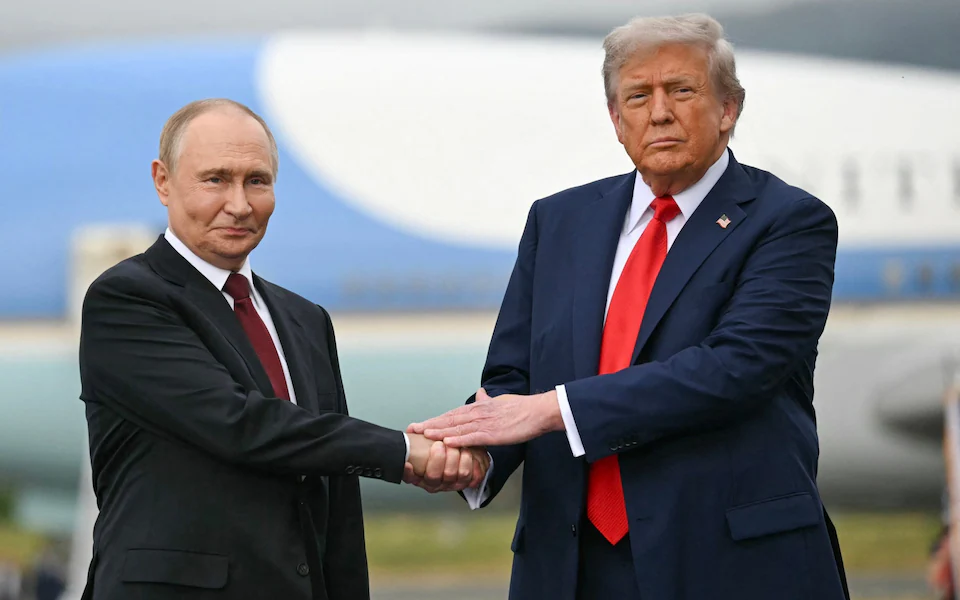
Trump has therefore chosen a particularly painful moment to begin turning the screws on Putin.
The US president shocked the world by upending Western foreign policy on Ukraine after he came to power, moving much closer to Moscow than Kyiv.
Trump claimed he had developed “a very close relationship” with Putin, invited him for a summit in Alaska and accused Volodymyr Zelensky, the Ukrainian president, of being the obstruction to a peace deal.
But this month he changed his tone. Trump told reporters in the Oval Office: “He’s got to really settle this war. And you know they have long lines waiting for gasoline in Russia right now.”
Trump has become increasingly frustrated with Russia’s lack of progress towards a peace deal.
Relations soured on Monday after Sergei Lavrov, the Russian foreign minister, told Marco Rubio, the US secretary of state, that Russia would not agree to a ceasefire that froze the frontlines in Ukraine. Plans for a meeting between Trump and Putin in Hungary were scrapped.
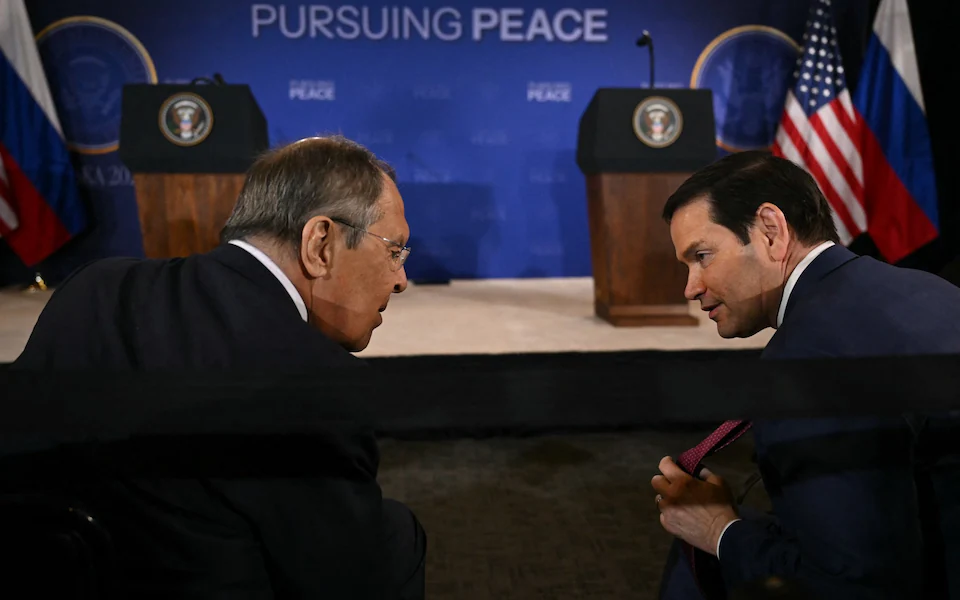
Scott Bessent, the US treasury secretary, announced sanctions on two of Russia’s largest oil companies, Rosneft and Lukoil, on Wednesday. They were the Trump administration’s first sanctions against the country since he began his second term.
Crucially, the White House has threatened sanctions on the international banks that facilitate payments on these exports, driving up the risks for China and India, the key buyers of Russian oil.
Oil prices surged by 7pc in the two days after the announcement as Chinese state oil majors suspended purchases of seaborne Russian oil and Indian refineries sharply cut their crude imports.
That may sound like good news for an economy like Russia’s that is powered by oil. But the White House move was well-timed.
There is a global glut of oil that will limit how high prices will realistically go. Even after the movement in recent days, the price of Brent crude is still down by more than 13pc since the start of the year, at $65.74.
The new sanctions impact around three million barrels of oil per day, or nearly half of Russia’s total exports. Bridget Payne, the head of energy forecasting at Oxford Economics, believes Russia will still find ways to continue selling its oil but will get an even lower price for what it does manage to sell.
“There is a sense that the wind has changed direction,” says Tom Keatinge, the director of the centre for finance and security at the Royal United Services Institute, of the new sanctions. “This is a critical moment for Russia.”
Russia’s economic weakness may encourage Trump to go further. “A major argument for him pushing Ukraine to compromise was that Russia would inevitably win this war. As he put it tactlessly in the White House, ‘You have no cards,’” says a former US diplomat, referring to Trump’s explosive White House press conference in February. “He does like winners.”
Now, it may be Putin who has no cards.
Intense pressure will be essential if Trump truly wants to stop the war, says Khodorkovsky.
“All the concessions that could have been offered to Putin have already been offered. It’s time for Trump to play the ‘bad cop’.”
He appears to be doing just that, pushing Russia’s economy to the brink. Trump told reporters in the Oval Office: “All of a sudden this economy is going to collapse.”
The article was first published in The Telegraph



